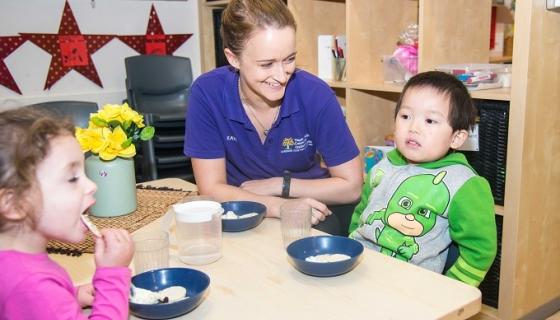
The right food and drinks for the right child
It is so important that children in education and care receive the right food and drinks for their dietary and health needs. This is covered in the Education and Care Services National Regulations, regs 78 and 79.
It is concerning that several young children at services were recently given bottles that did not belong to them. This means they were exposed to formula, cow’s milk or breastmilk not intended for them.
There have also been concerning incidents where children have been given:
- food prepared for them containing an ingredient they are known to be allergic to
- another child’s food bowl containing an allergen
- access to food that contravenes the child’s dietary/health requirements.
Food allergies and intolerances can be detrimental and dangerous to some children’s health and wellbeing.
Adverse food reactions can be a food allergy (primarily involving the immune system) or food intolerance (usually not involving the immune system – but the digestive system).
Food allergies affect around one in 20 children in Australia.
Allergic reactions can be mild to moderate: swelling of face, lips and/or eyes, hives or welts on the skin, stomach/abdominal pain and vomiting. Or they can also be severe: anaphylaxis, which affects breathing and the heart. Anaphylaxis can be life threatening.
The effective management of medical conditions is critical (reg 90). If a child has a health condition or allergy, the service must have a medical management plan, risk-minimisation plan and communication plan for the child.
Key points for safely serving food and drinks:
- Know and follow your service’s policy and procedures.
- Implement the medical management plan, risk-minimisation and communication plan for each child with a medical condition.
- Ensure new staff know and are supported to follow procedures.
- Check ingredient labels carefully.
- Check and double check that children with food allergies or special dietary requirements receive only food and drinks suitable for them.
For more information:
- ‘Three plans for children with health needs’, Education Standards Board website
- ’Childcare resources: Practical strategies for food allergy management in child care’, Allergy & Anaphylaxis Australia
- Types of adverse reactions to food:
- ‘Food intolerance’, Australian Society of Clinical Immunology and Allergy website
- ‘Food allergy or intolerance?’, Allergy & Anaphylaxis Australia website
- ‘Compare the difference’, Allergy & Anaphylaxis Australia website

